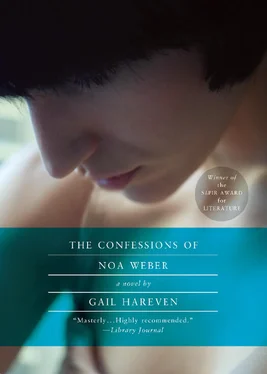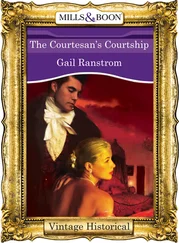And what was I doing there? The Christian God was Alek’s God, the specific god that Alek didn’t believe in. But a god you don’t believe in is still a god, and so it happened that when I was pining for Alek’s love, I went and prostrated myself to his gods.
I have already made it clear, I think, that I find no touching charm or beauty in this — though this is not absolutely the truth. However much I despise myself for my attacks of religious epilepsy, I despise my daughter, without any justification, more. Despise not only her convenient, dietetic, easy to digest religion, but she herself, for the small, civilized instinct that she cultivates by will. Hagar is of course not deserving of this contempt, and who am I to despise my honest daughter, immeasurably more honest than I.
Since Hagar’s new Jewishness isn’t only an aspect of her life, but something that determines it more and more, the diplomatic dishonesty in our relationship will no doubt grow greater over the years. With her grandmothers, astonishingly enough, Hagar has found a common language, and her preoccupation with religion has only increased the love that they both feel for her anyway. My mother is capable of spending hours nodding in admiration as my daughter lectures her on Jewish culture/Jewish renewal/new ways of interpreting Jewish traditions, etc. Meekly she agrees that a great injustice had been done her by her parents who robbed her of “her roots,” “her culture” and “her Jewish bookshelf,” and glowing with pride she occasionally accompanies her granddaughter to Saturday morning services at her progressive synagogue.
As for Grandmother Marina, Alek’s mother, it seems to me that she is happy that her granddaughter is showing an interest in “spirituality,” even though she has no idea of the nature of this “spirituality,” and although no serious discussion is possible between them, both because they have no common language, and because of the vast cultural gap between them.
When her father invited her to visit him in Paris, after she was discharged from the army and after my first visit to Moscow, Hagar was still at the beginning of her “Judaization” process, full of conceptual doubts and willing to sit up until the wee hours of morning debating such questions as “What is Jewish identity?” and “Is Judaism a religion/nationality or a culture?” In her debating style she sometimes reminds me more of Amikam than of her father. In the ten days she spent with her grandmother in Paris the child did not find an answer to the vexing question of whether Grandmother Marina, who had secretly converted to Christianity while still in Russia, could be considered a Jew.
I understood that all kinds of relations who were strangers to her and also strangers who weren’t related to her at all, enveloped her in warmth and love there, fed her as if she were a baby, accompanied her everywhere she went so that she wouldn’t get lost in the big city, and that no serious clarifications took place, either with Alek or with Marina. Alek waited for her outside when she went into Notre Dame Cathedral, and at the same opportunity remarked, by the way, that in recent years his mother’s church attendance had fallen off. A couple of times Marina said grace in Russian when they sat down to eat; over her and her husband’s double bed hung a triangle of beautiful icons — what the husband, Jenia’s, position was on these matters I do not know, for some reason he was seldom mentioned, as if he didn’t count — and when they parted at the airport Marina covertly made the sign of the cross over her granddaughter’s head. These were all the clues that Hagar received, and she had no idea what to make of them, but for a while it seemed that her tendency to set the world in order in the same way as she tidied her room had been swallowed up in a torrent of sense impressions: the smell of cheese and roasting chestnuts, the taste of new foods, the giddiness of the wine to which she was not accustomed, an exhibition of paintings, a statue, the view of a street framed in a café window.
Hagar talked without stopping, and a little rodent inside me devoured it all to the last crumb, while I kept my eyes and hands busy sorting the washing, folding the washing, cutting up the salad, so that she wouldn’t see and wouldn’t guess at the depths of my abject longing to feel the touch of the air around her father.
In my imagination I followed them to the Louvre “to see the Impressionists,” and only after she piled on the details and digressed in various directions did I discover that she went to the Louvre not with Alek but with “a terribly interesting friend of Grandma Marina’s, an artist who’s actually an American, but she’s been living in Paris for years.” And I felt a similar secret shame at the description of the “amazing picnic in the Bois de Boulogne,” which I only discovered later had not been attended by Alek.
To my complete and utter surprise it seemed to me that Grandma Marina had captured Hagar’s imagination and thoughts more than her father — or perhaps she had enabled her to avoid thinking about her father and her relationship with him. “You know that at Granny Marina’s, people phone up at one o’clock in the morning as if it’s the middle of the day.” “The most amazing thing is that Granny’s gorgeous, you should see her, she’s got legs that look as if they reach all the way to her neck, much better than mine.” Or: “I don’t understand how come Grandma Marina, with her gift for languages, never took the trouble to learn English.” The stream of her chatter flowed on and on, and I drank it in thirstily, until she gradually returned to her old boring ways, with questions like: “So in your opinion, can Brother Daniel, a Christian priest who claims to be Jewish, be considered a Jew just because he was born one?”
I HAD REACHED THE MORNING OF MY WEDDING
I had reached the morning of my wedding, in the month of October, in the year 1972, and as far as possible I shall try to stick with this chronology, without getting ahead of myself or digressing at every thought that pops into my head. But if I’m going to talk about my wedding, there is an impression I must correct first: when I mentioned the consolation fuck Alek gave me after my leaving-home scene I didn’t say that it was our only fuck since the day we presented ourselves at the Rabbinate.
It is clear to me, and it was clear to me then too, that Alek, to the best of his nonverbal ability, was trying to clarify himself to me: don’t mistake me and don’t deceive yourself, we’re talking about a fictitious marriage here, and you don’t fuck a woman you’re married to fictitiously in every corner of the house, and you certainly don’t stroke her hair and look into her eyes before, after, and during the act.
Alek, being Alek, was incapable of not offering me his home after I was “thrown out by my parents who demanded that I go to the army,” but the fact that I was living with him only complicated the situation. If I hadn’t been living there, maybe he wouldn’t have abstained from me entirely, but living together was too much like proper married life and he was therefore obliged to draw the line.
“Obliged to draw the line”—I am presenting his abstinence as if it stemmed from an explicit decision. I would like to believe that it came from some deliberate decision, on principle, which was the only reason he kept away from me even though he still desired me greatly. It would be nice to believe this face-saving explanation, very nice, but I know very well, and I knew very well, that it isn’t so. I haven’t got a clue whether Alek “decided” to abstain from me, maybe he “decided” and maybe he didn’t, but in any event it is clear to me that most of the time he didn’t need any “decision” to depend on or remind himself of. The simple truth is that the farce of the marriage, the political act of the marriage — whatever we call it — produced a sense of complication and turned Noa Weber into an oppressive presence on the ground. It didn’t happen in a minute, it didn’t happen in a day, and in the terrible months of chilliness there were still moments of warmth, but the process was very rapid.
Читать дальше












